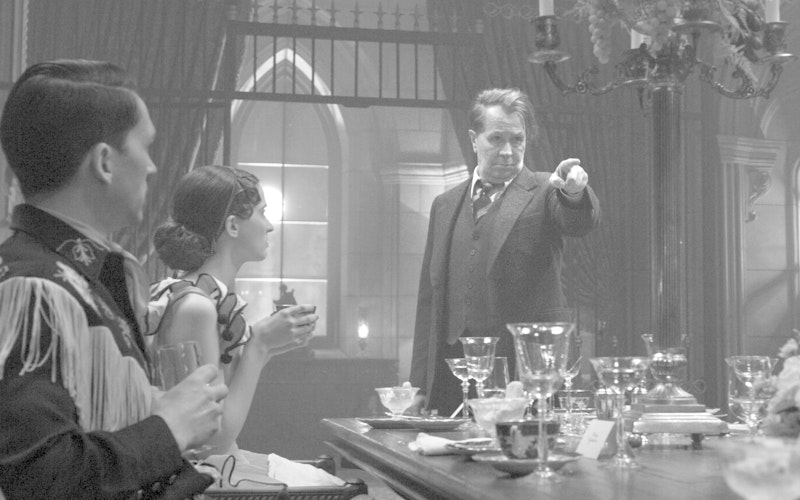
Movies
The Prophet Mank
Nominated for 10 Oscars and available on Netflix, Mank is a complex film about the making of a complex film. Elegantly told across two timelines, director David Fincher’s magnum opus goes well beyond a cookie-cutter biopic about legendary Hollywood wit Herman Mankiewicz (Gary Oldman) and his struggles to write the screenplay for 1941's Citizen Kane. As depicted in the screenplay (by Jack Fincher, David Fincher’s late father), Mank repeatedly lampoons the latent hypocrisy and brutal inhumanity of Hollywood’s dream machine. In doing so, this self-described “washed-up” screenwriter impishly reminds viewers that, flaws and all, great prophets (and artists) courageously speak truth to power.
Throughout the film, Mank’s disdain for hypocrisy often reveals itself through witty quips aimed at powerful men. Early on, Mank witnesses Louis B. Mayer (Arliss Howard) earnestly plead with his MGM employees to accept a fifty-percent pay cut so the studio may survive the Great Depression intact. Almost groveling, Mayer endears himself to his employees, preaching, “I won’t break up this family over something like money.” Knowing Mayer’s self-serving nature and deep pockets, Mank sardonically observes, “Not even the most disgraceful thing I have ever seen.” Later, when it is revealed that Mayer reneged on his promise to pay lost wages to MGM’s employees, Mank quips, “The hypocrisy . . . everything he does is for family, except when it comes to selling his last name to a competitor in the middle of the night.”
The moral comparison between Mayer and Mank intensifies when both men attend the funeral of studio executive Irving G. Thalberg. Publicly performing his grief with indiscrete sobs, Mayer lingers in the crowd long enough for everyone to see. Only Mank notices Mayer abruptly switch off his tears before being whisked away in his conspicuously expensive car.
Whereas Mayer feigns caring but lives indifference, Mank takes the opposite path. This becomes clear in the later timeline of the film, during a period in which Mank is recovering from a serious car accident. When asked to defend her loyalty to her alcoholic and antisocial patient, Mank’s German caregiver, Fraulein Freda (Monika Gossmann), reveals that he secretly donated the funds necessary to save 100 Jewish residents in her village from Nazis. Confronted with his altruism, Mank replies, “Dear Freda. What’s German for blabbermouth?”
This juxtaposition of Mayer’s flagrant acts of hypocrisy and Mank’s private gifts of generosity evokes Jesus’s warning in Matthew 6: “Be careful not to practice your righteousness in front of others to be seen by them. If you do, you will have no reward from your Father in heaven.” Unlike Mayer’s public and fake expressions of righteousness, Mank does not tell his left hand what his right hand is doing. Instead, and with limited resources, his giving is “done in secret.”
Mank’s disdain for hypocrisy often reveals itself through witty quips aimed at powerful men.
Beyond his contempt for Mayer, Mank’s harshest rebukes are predictably directed at William Randolph Hearst (Charles Dance), the real-life tycoon who was the inspiration for Citizen Kane. In the earlier timeline, Mank attends a brazenly ostentatious costume ball held at Hearst’s palatial home. In a tour de force performance by Oldman, Mank delivers a dazzling monologue in which he drunkenly pitches the yet-to-be-written concept for Citizen Kane to his powerful host and his embarrassed guests. He artfully compares Hearst to Cervantes’s famous hero, Don Quixote (if you didn’t pick this up by now, Mank is a pretty erudite film). Among other barbs, Mank states, “Our Quixote, he hungers, he thirsts, he lusts for voters to love him. Love him enough to make him president. But they won’t. And they don’t. How do you suppose that could happen? Could it be because, in their hearts, they know that he values power over people?”
Armed only with his drunkenly inappropriate wit and a sincere desire to love his neighbor, Mank publicly proclaims the uncomfortable truth that no one else in the room would ever dare to profess.
Perhaps Mank’s willingness to speak truth to power explains his closing confrontation with Orson Welles (Tom Burke). Even though his contract to write Citizen Kane stipulates that he will not receive a screen credit, Mank infuriates Welles by insisting that his name appear in the final version. In wanting credit for “the best thing I’ve ever written,” Mank clearly knows that connecting his identity to this toxic subject means that he will never work again. True to form, prophets do not hide.
Admittedly, a comparison to a biblical prophet may seem inappropriate considering Mank’s status as a raging alcoholic, gambler, absent husband, and all-around gadfly. But, as the film progresses, his vices recede beneath his overriding longing for virtue and justice. And let’s be honest: Mank’s transgressions probably compare favorably to Jacob’s deceiving, Noah’s drinking, David’s murderous affair, or Peter’s denial. Although more colorful and comedic than many biblical prophets, Mank’s prophetic voice bravely critiques the power and influence of the kings of this time. His quest for righteousness does not seem all that far from a vulnerable Nathan fearlessly rebuking King David for not living up to the promise of his great power and position.
Indeed, recognizing the power of cinema to inculcate morality, Mank at one point implores a fellow screenwriter: “We have to be vigilant. . . . People sitting in the dark, willingly checking their disbelief at the door. We have a huge responsibility.”
Topics: Movies